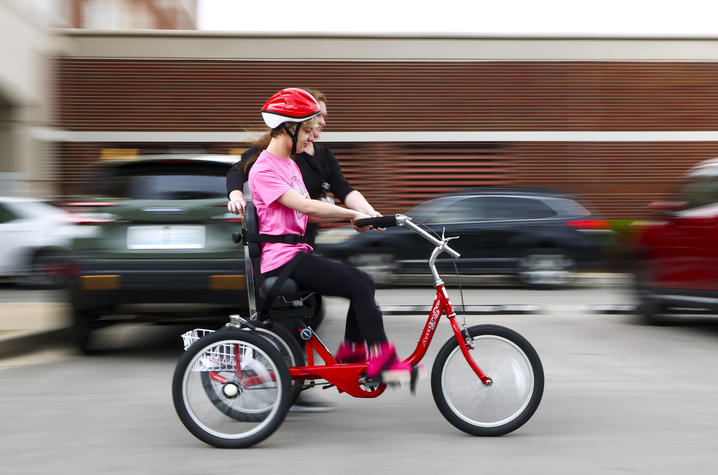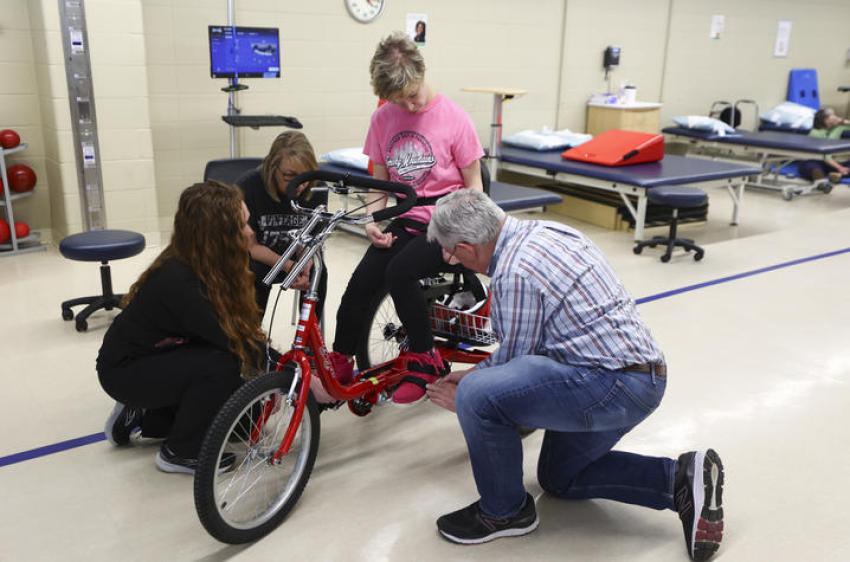Adapted bike brings ‛pure happiness’ to UK patient
Jul 15, 2024

By Hayden Gooding
UK Now
LEXINGTON, KY. (July 15, 2024) – It was a day full of excitement, smiles and cheer when 21-year-old Jessica Standiford received her very own bicycle for the first time.
Most children start riding bicycles between 3 and 8 years old, but until now, Standiford didn’t have a bike that met her needs.
While in her mother’s womb, Standiford’s umbilical cord was wrapped twice around her neck. This prevented oxygen from reaching her brain. When she was born, doctors had to resuscitate her. Standiford suffered multiple seizures because of the lack of oxygen.
Soon after birth, Standiford was diagnosed with spastic quadriplegia cerebral palsy (CP). CP is caused by an injury to the brain, in most cases before birth, and makes it difficult for the patient to control movement. Quadriplegia CP means all four limbs are affected.
“When my diagnosis with cerebral palsy was official, we were sent over to a neurologist, who told my mom that I would never be able to do anything,” said Standiford.

With CP, Standiford doesn’t have full control over her muscles. She is completely aware of what she wants to do or say, but her brain doesn’t always communicate with her muscles quickly. She also finds that her brain miscommunicates with her muscles, which can throw her body off completely.
“Growing up with CP has been a challenge,” said Standiford. “It’s very hard and frustrating for me to watch people without a disability do ‘normal kid things,’ like play sports, run around with friends, or learn how to drive. However, I will say that I’m lucky to be a part of a family that loves me so much and doesn’t treat me like I have CP.”
The lack of control over her muscles impacts her walking, moving her arms and speech, but that didn’t stop Standiford from being strong.
“One of my biggest accomplishments has been learning how to walk,” said Standiford. “With all of the hard work I put into my therapies that I started as a baby, I was able to keep fighting and had a strong determination to prove that doctor wrong. Especially when it came to walking, talking and doing the typical activities that a person without CP would do.”
When it was time for her to begin school, most of her doctors suggested she should be in a special education environment. But once again, she proved the doctors wrong and was able to read and write by the time she was ready for kindergarten.
It was decided that she did have the ability to be in a general education setting, and Standiford went on to graduate high school with straight A’s. Her teachers recall that she was one of their most hardworking students.
But there was still one thing Standiford wanted to accomplish - riding a bike.
“When I started physical therapy at the UK HealthCare Outpatient Therapy Clinic at Cardinal Hill, one of the activities that the physical therapist had me do was the stepper, similar to a stationary bike,” said Standiford. “I could never ride a regular bike before, so when she put me on the stepper, I ended up having the time of my life.”
Heather Witt, D.P.T., is one of Standiford’s physical therapists at the outpatient therapy clinic, and she is also the associate director of clinical education for the physical therapy department in the UK College of Health Sciences.

“Jessica and her mother are always the happiest people in the room,” said Witt. “She is a patient who always wants to try new things and wants to challenge herself.”
Jessica expressed to her care team that she couldn’t ride a bike like everyone else while she was growing up, which was why she enjoyed doing therapy on the stepper.
“As a physical therapist, our goal is to get people to do the things that they love,” said Witt. “We want to be able to problem-solve and figure out ways to adapt things or get our patients healthier to be able to do the things they want to do.”
Jessica’s care team had the perfect idea to make her goal of riding a bike become a reality.
The College of Health Sciences has been a supporter of the Bluegrass AMBUCS chapter for more than seven years. AMBUCS is known for providing adapted bicycles to people with special needs.
Although the Bluegrass chapter historically has funded bikes for children, they are now expanding to provide bikes to adults with lifelong disabilities. Their Amtryke is a tricycle that can be fully customizable to a patient’s needs.
Through their partnership with AMBUCS, Jessica became a perfect candidate to receive an Amtryke. The physical therapists at UK Cardinal Hill provided information for the type, size and adaptations needed for her bike and the funding was received through Bluegrass AMBUCS.
“We were able to go with her to test a trial bike and see her ride the bike for the first time,” said Witt. “She was outside just zooming, I was running to keep up with her on this bike. It was a moment of pure happiness. Being able to be part of that joyful moment was really rewarding.”
After finalizing the design of the bike to fit Jessica perfectly, it was shipped to Lexington and assembled at a bike build with several Bluegrass AMBUCS volunteers.
Then it was time for her to receive the Amtryke at UK Cardinal Hill and take it home with her.
“When I got on my bike, I was able to let my body relax and stay stable so I could do the pedaling I needed to do for the bike,” said Standiford.
It was a special day and an exciting moment she will never forget.
“This is very special to me,” said Standiford. “Never being able to ride a regular bike because of CP has always been a frustrating feeling of being left out. So now that I have a bike that fits my needs, I feel like I have a chance to make up for all the time I thought there was no chance for me to ride a bike.”
This summer she is looking forward to riding around her neighborhood and building up her confidence to ride her bike whenever and wherever she wants.
Her goal is to continue to get stronger in all her therapies and eventually have more independence in life. She knows that CP will always be part of her, but if she continues to work hard and preserve she will do more than she ever imagined.
“Don’t let anybody tell you what you can and cannot do,” said Standiford. “You are the only one that knows your body. If someone tries to tell you that you can’t or won’t do something, face that task like it’s life or death and do not walk away until you’ve given it your absolute all. Prove them wrong!”
UK HealthCare is the hospitals and clinics of the University of Kentucky. But it is so much more. It is more than 10,000 dedicated health care professionals committed to providing advanced subspecialty care for the most critically injured and ill patients from the Commonwealth and beyond. It also is the home of the state’s only National Cancer Institute (NCI)-designated Comprehensive Cancer Center, a Level IV Neonatal Intensive Care Unit that cares for the tiniest and sickest newborns, the region’s only Level 1 trauma center and Kentucky’s top hospital ranked by U.S. News & World Report.
As an academic research institution, we are continuously pursuing the next generation of cures, treatments, protocols and policies. Our discoveries have the potential to change what’s medically possible within our lifetimes. Our educators and thought leaders are transforming the health care landscape as our six health professions colleges teach the next generation of doctors, nurses, pharmacists and other health care professionals, spreading the highest standards of care. UK HealthCare is the power of advanced medicine committed to creating a healthier Kentucky, now and for generations to come.